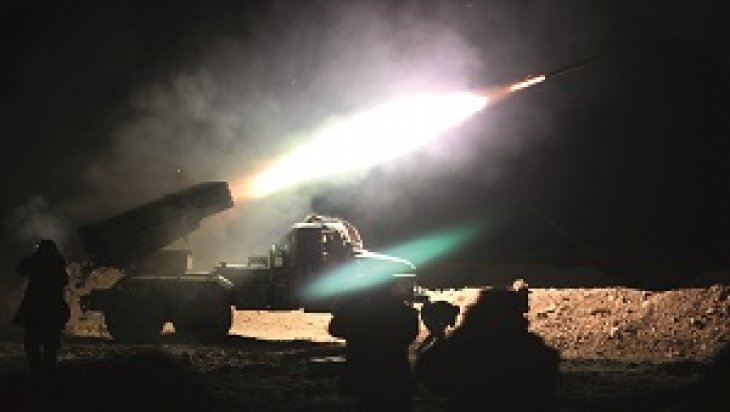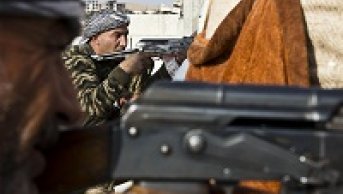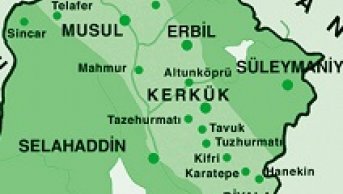Raqqa Operation Codes

By supporting terrorist organization PKK's Syrian branch PYD's military wing People's Protection Units (YPG) and Syrian Democratic Forces, whose majority comprises of the YPG,the United Statessought to initiate Raqqa Operation at the end of May. YPG/SDG could not make any progress in the city which terrorist organization ISIS has been controlling for 2,5 years. After an unsuccessful week, YPG and SDG switched their direction to Manbij drawing on the support from the US airstrikes and special forces units on the ground. Failing in Raqqa operation, which had been in planning for a long time, and not sustaining the operation forces us to ask what was planned/done wrong in Raqqa.
Towards ISIS's 'Castle'
Raqqa is the third biggest city of Syria and it is on the Euphrates River. The city is 160 km away from Aleppo in its west and Al-Hasakah Governorate in its east, and also in its North; it is 90 kms away from Turkey's Şanlıurfa- Akçakale border. It is asserted that the city's 220 thousand population before the civil war has increased to 500 thousand to 1 million after ISIS. In Raqqa, majority of the population is Arabs, who have a strong tribal structure. The Kurdish people also compose three percent of the city center's population. Raqqa's location is strategically important for some reasons: even though half of its land is desert, it has fertile lands on the Euphrates riverside, and it is located on the intersection of the country's main roads and trade routes,and lastly it neighbors the Deir-ez Zor which is close to Iraq. When the Syrian opposition seized the control of Raqqa in March 2013 they celebrated their success by demolishing Assad's statues. However, in January 2014, they lost the city to ISIS which declared the city as '' the capital of caliphate''. The city where the organization paraded with SCUD missiles, also came to the forefront with ISIS leader Baghdadi's constant calls for jihad.
Following the capture of the city by ISIS, the coalition against ISIS led by the US,conducted airstrikes from time to time. At the beginning of May, airstrikes intensified. CENTCOM's General Joseph Votel's visit to the northern Syria in order to meet PYD/SDG leaders and his subsequent visit to Ankara signalled the Raqqa Operation. Raqqa Operation was initiated on 24 May by the SDG forces led by the US and YPG. With the participation of the opposition groups supported by the YPG, SDG and the US, 12 thousand people took part in the operation as well as 500 American soldiers. In order to excite the West's attention, PYD announced the initiation of the operation by a female commander. Operation forces attacked from 3 directions in Ain Issa town which is located 70 km away from Raqqa in the North. The forces also opened fronts in Tishrin Dam located 100 km away from city in the Northwest and in Tabqa Dam, 50 km away from the West. In the first four days of the operation, 150 people were killed from both the YPG and SDG. In the sixth day, in an area of 45 km, 10 villages were taken over and only 10 km of progress could be achieved; thus, the forces could approach to Raqqa only by 40 km. Just one week after the operation's initiation, on 1 June, YPG/SDG forces, who are supported by the US, changed their direction with a sudden decision toward Manbij, which is controlled by ISIS and is located 140 km Northwest of Raqqa. This development showed that the operation, which was planned for so long, has failed.
Factors behind the Failure
Behind the failure of the Raqqa operation, not only the inadequacy of the preparations, but also different motivations of the US, YPG and SDG played a role. Before the operation, YPG aimed to go towards the area between Afrin and Kobani, where Turkey plans to set up a safe zone, in order to connect the three cantons in the North of the city. However, as a result of Turkey's objections, the US changed the direction of the operation to Raqqa. In the fight against ISIS,in addition to the YPG's not being able to realize its own strategic agenda, also the question of ''Why do the Kurdish people die for an Arab city' caused discussions and resulted in the loss of motivation. On the other hand, although the SDG includes partially Arabs, their being under the control of the YPG caused concerns among Arabs in Syria because in the past after the takeover of a city by YPG forces, people were arrested, tortured and even got killed.
As a result of the US policy of not finishing the ISIS terror organization completely but to weaken them and also their policy of preferring the YPG/SDG as local partners,the fight against ISIS has been stalled. It could be said that this policy has also caused Raqqa operation to fail. With the coalition in Syria, many groups which can fight against ISIS were ignored and alliances could not be made with Arabs among Raqqa inhabitants who have strong bonds with the tribal structure. This situation caused anxiety among Arabs who live both in the country and Raqqa. The forces carrying out the operation could not offer adequate motivation for Arabs in the city to rebel against ISIS. They also could not create safe corridors for the civilians in the capital. This resulted in mass execution of thousands of people by ISIS while they were trying to escape; thus people started to question the operation. In addition to the inadequate motivation and the weakness of the powers carrying out the operation, ISIS which did not want to be a target of missiles and drones, took some precautions, such as covering the streets of the city with awnings and collecting the satellites in order not to be found and as those satellites help intelligence gathering. By making human shields, ISIS forced men to mobilize and with traps, mines and suicide attacks, the precautions taken in Raqqa have weakened the operation.
The YPG in fact wanted to open afront to Manbij in order to make progress according to its own agenda. Manbij is 40 km south of the Jarabulus and 30 km west of the Euphrates, where Turkey wants to set up a safe zone. As a result, their alliance with the US was partly the reason behind the unsuccessful Raqqa operation. Only after a week the operation forces targeted Raqqa, they redirected to Manbij, which is 40 km close to Turkey border. The PYD's attention on Manbij, which is an important point leading to Jarabulus and Afrin, and its not insisting on Raqqa is a main reason for the failure of the operation. Within this context, it could be said that PYD did not give priority to the Raqqa operation, but they accepted it in order not to lose the US support. In the beginning of the Raqqa operation, PYD Kobani official İdris Nassan made the following statement: '' In order to prevent the attacks from the South and to protect our border, we initiated an operation in the North of Raqqa. For now, we do not aim to proceed to the city center. Our main goals are always Manbij and Jarabulus. But for now, as we are dealing with Raqqa, it does not seem possible for us to deal with these regions.'' His speech verifies this situation and shows the PYD's basic strategy about the operation.
After visiting Northern Syrian, American commander Votel visited Ankara before the Raqqa operation and he was warned about cooperation with YPG. A couple of days after this, Turkey lost its confidence to the US as the special forces soldiers had YPG arms on their uniforms. Turkey earned an important place among coalition countries against ISIS as it opened İncirlik Air Base. However when the US took a step back with this attitude, it was seen that the planning of the operation is an example of frivolity and besides this caused a problem in the cooperation with Turkey.
Will Raqqa Gates Be Opened?
In President Barack Obama's last period, in order to gain success against ISIS after Manbij was taken under control and its connection with Raqqa cut out, the US re-targeting Raqqa seems possible. PYD is considering the possibility of new President's changing Syria policy after the elections in November. Until then, they are obliged to keep pace with Obama administration's Raqqa plans, in order to realize their aim of capturing the Azaz-Jarablus corridor between Afrin and Kobanî cantons. PYD also plans to become stronger as the force that demolished the ISIS castle through the future Raqqa operation and to be praised in the West and also to join the meetings in Geneva. In short, while taking over Raqqa may not be the PYD’s main priority, its consequences for he PYD are important.
The US and YPG/SDG forces played a role in the failure of the operation which started on 24 May. It is obvious that if these forces become successful militarily in a second Raqqa operation, they will face several problems such as how to ensure the security of the city, how to distinguish the ISIS members and civilians and how to treat the public's traumatic wounds. In addition to all of these, it could be said that starting a new operation without planning who will control Raqqaafter ISIS, where the majority is Arabs, and how it will be administrated, it will most likely end up with failure.
This article was published in Ortadoğu Analiz journal with the title of "Raqqa Operation Codes”









